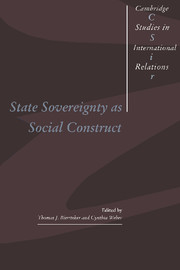Book contents
- Frontmatter
- Contents
- List of figures
- List of contributors
- Acknowledgments
- 1 The social construction of state sovereignty
- 2 Contested sovereignty: the social construction of colonial imperialism
- 3 Beyond the sovereignty dilemma: quasi-states as social construct
- 4 The sovereign state system as political-territorial ideal: historical and contemporary considerations
- 5 Sovereignty and the nation: constructing the boundaries of national identity
- 6 Sovereignty, nationalism, and regional order in the Arab states system
- 7 Binding sovereigns: authorities, structures, and geopolitics in Philadelphian systems
- 8 Hierarchy under anarchy: informal empire and the East German state
- 9 Reconstructing the analysis of sovereignty: concluding reflections and directions for future research
- Index
- Titles in the series
1 - The social construction of state sovereignty
Published online by Cambridge University Press: 01 June 2011
- Frontmatter
- Contents
- List of figures
- List of contributors
- Acknowledgments
- 1 The social construction of state sovereignty
- 2 Contested sovereignty: the social construction of colonial imperialism
- 3 Beyond the sovereignty dilemma: quasi-states as social construct
- 4 The sovereign state system as political-territorial ideal: historical and contemporary considerations
- 5 Sovereignty and the nation: constructing the boundaries of national identity
- 6 Sovereignty, nationalism, and regional order in the Arab states system
- 7 Binding sovereigns: authorities, structures, and geopolitics in Philadelphian systems
- 8 Hierarchy under anarchy: informal empire and the East German state
- 9 Reconstructing the analysis of sovereignty: concluding reflections and directions for future research
- Index
- Titles in the series
Summary
During the last several years, there has been a virtual explosion of scholarly interest in sovereignty. This interest transcends all of the major divisions within the study of international relations, and it engages scholars across the globe. There has been a comparable increase in the level of attention given to sovereignty within the popular media. Much of this concern with sovereignty can be explained at least in part by the end of the Cold War and the possibilities of a “New World Order,” which have raised questions about many old assumptions, including those made about state sovereignty. Moreover, the dramatic fragmentation and dismemberment of major states such as Yugoslavia and the Soviet Union, along with the potential fragmentation of many others, have led to renewed questions about the location of sovereignty – whether it lies in a population, or within a contiguous territorial space – and about the criteria for recognition as a sovereign state. As questions begin to be raised about the criteria for recognizing the modern state, can challenges to the traditional idea of sovereignty be far behind?
Traditionally, sovereignty has been characterized as a basic rule of coexistence within the states system, a concept that transcends both ideological differences and the rise and fall of major powers, and it is frequently invoked as an institution that must be both protected and defended.
- Type
- Chapter
- Information
- State Sovereignty as Social Construct , pp. 1 - 21Publisher: Cambridge University PressPrint publication year: 1996
- 52
- Cited by



